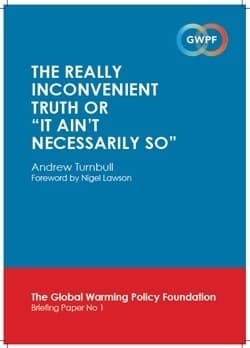Last week, a prominent retired UK civil servant issued a plea for sanity. This 20-page document,authored by Andrew Turnbull, urges politicians, scientists, and journalists to think more carefully about the costly, regressive, far-reaching climate change policies currently being pursued in that country.
Turnbull says the British government has uncritically adopted “the narrative created by the Intergovernmental Panel on Climate Change” (IPCC). In this narrative, out of numerous variables that might be interacting with one another in a system as enormous and as complex as this planet’s global climate, a single trace gas has been singled out.
In effect, carbon dioxide has been named the arch villain. Large swaths of the UK government have made fighting it a top priority. But what if all that attention and money is being wasted? What if this arch villain is, at most, a petty criminal?
As Turnbull makes clear, the IPCC’s narrative depends on a chain of reasoning. But virtually every link in that chain is subject to dispute and controversy. Buying into the CO2-is-the-villain story requires intelligent people to trust that, in each and every one of these disputes, the IPCC is right and its critics are wrong.
How likely is that, really? The fact of the matter is that few of these controversies have clearcut, yes/no answers. Rather, they involve judgment calls and competing theories. Turnbull is correct to point out that the IPCC climate models have “assumed but not proven” (italics added) that the climate system will react to a bit more CO2 in the atmosphere by amplifying its warming effect to a harmful degree.
It’s remarkable that, based on this assumption, the entire world is spending billions. We’re imposing heavy-handed – perhaps crippling – regulations on healthy, job-providing industries. We are, as Turnbull points out, increasing the costs of home heating to poor people so that subsidies can be handed over to more affluent members of society lucky enough to own land on which they can install government-subsidized wind turbines and solar panels. (When these folks are paid several times the market rate for the energy these devices produce, the extra costs increase everyone’s energy bills dramatically.)
In Turnbull’s opinion:
The IPCC’s view is a narrowly based and over simplified one.
He also thinks the IPCC “has made categorical statements” that leave the impression that matters are far more certain than they actually are. Here are a few more of his thoughts on the IPCC:
At the heart of the present debate is the IPCC. It likes to portray itself as an objective and independent source of advice on climate change. It is, in fact, no such thing. (p. 12)
Its key personnel and lead authors are appointed by governments. Its Summary for Policy Makers may sound like independent scientists speaking frankly to policy makers but, in practice, the policy makers join the drafting sessions and ensure they get what their political masters want. (p. 12)
There is a structural flaw in the IPCC. Far from being the distillation of the work of 2,500 scientists to produce a consensus, there is a core of 40-50 at its centre who are closely related, as colleagues, pupils, teachers, reviewers of each other’s work. The IPCC has failed to operate a rigorous conflicts of interest policy under which such relationships would be disclosed. (p. 13)
It is regrettable that the UK Parliament has proved so trusting and uncritical of the IPCC narrative. (p. 14)
Turnbull, who no doubt has the resources to spend his retirement as frivolously as he pleases, and who needs to be associating himself with unpopular causes like he needs a hole in his head, ends his plea for sanity this way:
Finally we need from our scientists more humility (Do not claim to be wiser than you are Romans 12), and a return to the tradition of scientific curiosity and challenge. We need more transparency and an end to attempts to freeze out dissenting voices. There should be more recognition of what they do not know. And acceptance of the Really Inconvenient Truth – that our understanding of the natural world does not justify the certainty in which the [humanity is causing dangerous global warming] views are expressed. (p. 15)
This is important stuff. Read the whole thing here.






